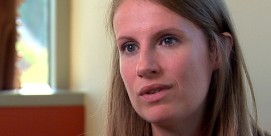GALEN CAREY (Vice President of Government Relations, National Association of Evangelicals): We are here to raise awareness of the tragedy of solitary confinement that keeps about 80,000 Americans behind bars without any human contact.
RABBI RACHEL GARTNER (T'ruah: A Rabbinic Call for Human Rights): There are so many clear, simple reasons why we stand firmly against the practice of solitary confinement in the United States, on a pragmatic level, simply pragmatically, we know that it's ineffective. Recidivism rates are higher in people who are released directly to the general population from solitary confinement. Prison violence we're seeing does not go down when there's increased solitary confinement. And also it's more costly for the United States when we run massive incarceration, massive solitary confinement units.
LAURA MARKLE DOWNTON (Director of U.S. Prisons Policy and Program, National Religious Campaign Against Torture): We believe that one of the reasons that this issue is drawing such national attention is in part a series of hunger strikes that took place in California prisons over the last several years.
This past summer in 2013, over 30,000 incarcerated individuals throughout the state of California participated in a hunger strike to call for an end to long term solitary confinement. Their hunger strike lasted for sixty days. It garnered support of religious leadership from around the globe. Their hunger strike was suspended after legislators in California agreed to begin addressing the issue of solitary confinement in the California system legislatively. There have been a series of hearings that have taken place in California as a result of that hunger strike. And it certainly has been a significant motivator for many communities to get engaged on this issue.
CAREY: God made us to be in contact with other human beings. And when we take that human contact away, it exacerbates whatever problems that may have been there before. So rather than rehabilitating people it actually makes them get worse.
DOWNTON: We understand that denying community, denying access to restoration, and subjecting individuals to 23 to 24 hour a day lockdown isolation is a violation of the human person. Our values call us to work for restoration and restorative justice, and we see that the use of isolation for adults and youth in our prisons is a profound violation of their inherent dignity and worth.
GARTNER: As Jews, we understand and have experienced what it means to be marginalized. What's hidden from us is those people that are deeply marginalized and put aside, out of society, out of view from us, those people that are confined to solitary confinement, so as Jews, we are called to empathize and enter those places and to make that cause visible. We're also compelled by the basic tenets of our tradition that teach us that every human being is created in the divine image and deserves basic human rights and basic human dignity.
CAREY: Evangelicals have been supporting prison ministries for a long time. Of course we know that Jesus said, “I was a prisoner, and you visited me.” So there is a direct Scriptural invitation for us to engage with people in prisons. Evangelicals support the largest prison ministry in the world, Prison Fellowship. So through this contact with prisoners many of our members have become aware of the conditions in which people are being held. We believe that there is a role for prisons, but it's one that is vastly overused in our current system where we have more than 2 million people behind bars, the highest rate of incarceration in the world.
GARTNER: Myriad text that call out against isolation as against divine intention for humanity. We have texts that say "Give me companionship or give me death." To our mind, isolation is a form of torture of spirit, of body, of mind, and isolation is not God's intention for us as human beings.
CAREY: There are many other ways and better ways that we can deal with crime that have to do with providing restitution for the victims and rehabilitation to the offenders so that they can reenter society and reach their potential as God given human beings with dignity and respect.
DOWNTON: We are very eager to see congress take action to the federal bureau of prisons in rigorous reform of their current use of isolation. Beyond that, we are also calling on the State Department to move forward in granting the UN special rapporteur on torture, Juan Mendez, his access to visit facilities within the US that use solitary confinement. Mr. Mendez made the request three years ago, and that request has gone unanswered.
We are calling for a ban on the use of solitary confinement for juveniles in the federal system as well as pregnant women, and individuals with severe mental illness. We know that solitary confinement causes mental illness. We also know that between one third and one half of the individuals that are subjected to isolation within our prisons, jails and detention centers are persons with mental illness.
GARTNER: There will arise in the hearts of the American people a profound unease or dis-ease with solitary confinement, it should shake us to the core and keep us awake at night, both us as citizens who are allowing this to happen on our watch and as leaders who have power to make real change. My hope is that we are driven by what we hear to act to end solitary confinement in the United States.


